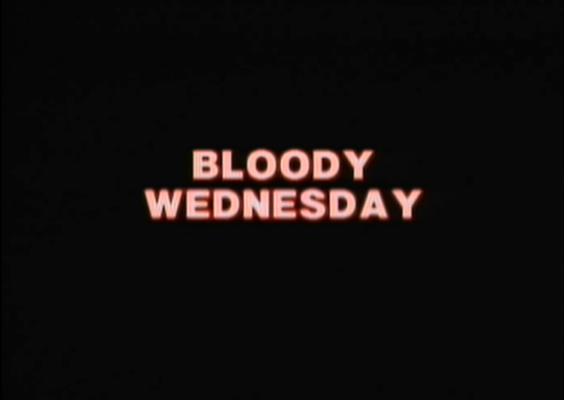
I love genre cinema. I will always have a soft spot for horror, action, sci-fi, and all the subgenres that exist inside those larger categories. What I have never felt any real connection to are those films that exist in the realm of pure sleaze. You know the ones: the films from the ’70s and ’80s, filled with ugly violence and sex that is the opposite of titillating, usually shot on cheap film stock with semi-amateur casts. But knowing these films have a large following and several companies devoted to restoring them makes me wonder what I am missing. So, armed with a subscription to Vinegar Syndrome’s Exploitation TV, I am going to do a deep dive into the world of sleazy exploitation. This is My Exploitation Education.
This review contains spoilers for the film.
I am grateful that the filmmakers behind BLOODY WEDNESDAY only took apparent inspiration from an actual mass shooting (when a gunman killed 21 people in a San Diego McDonald’s in 1984) and did not attempt to dramatize the events around the actual tragedy. This is a cheap exploitation movie after all, which should never try to profit directly off the senseless deaths of so many people. I have a feeling that producer/director Mark G. Gilhuis and producer/writer Philip Yordan did not want the baggage of such a relatively recent event (when such occurrences were not as prevalent as they are now) weighing down their movie. But the truth of the matter is that the filmmakers and the cast assembled were not up to the task of doing that particular story justice.
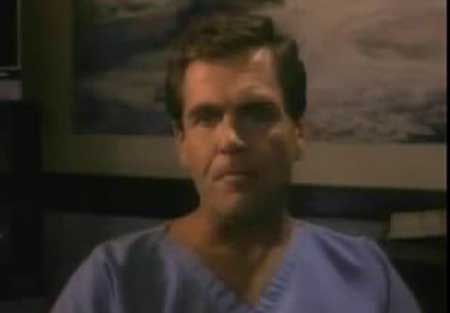
After nonsensical onscreen text (that is read oh-so-seriously by a narrator) about the random nature of violence in modern society, the story proper begins with Harry (Raymond Elmendorf) losing his job as a mechanic when he has a mental breakdown that includes taking apart a car’s motor down to the smallest component. Harry follows up this stunt by walking nude into Church services and gets taken to a county psychiatric facility where Dr. Johnson (Pamela Baker) begs Harry to allow her to admit him. When he refuses, she is forced to release him to his brother Ben (Navarre Perry), but not before issuing the warning that she fears Harry is a ticking time bomb.
Ben is a successful accountant who has had to deal with Harry’s mental breaks his whole life, so he is beyond annoyed to have to help Harry yet again. Since Harry can no longer afford his apartment without a job, Ben stashes him in an abandoned hotel owned by one of his clients. But leaving Harry alone in a huge empty building is the last thing his fragile psyche needs. Before long, Harry has not only run afoul of three local criminals who have a vendetta against him, he also finds himself falling deeper into a fantasy world where he interacts with ghosts in the hotel and believes his teddy bear is talking to him.
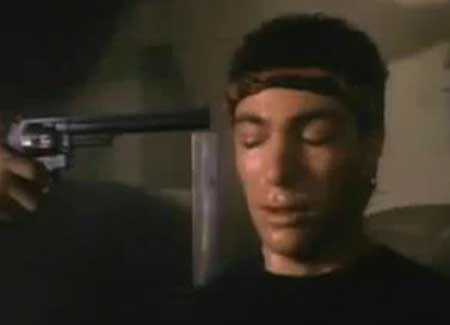
If you hadn’t guessed at this point, BLOODY WEDNESDAY is not exactly the most realistic portrait of someone suffering from mental illness.
For a film that implicitly tries to piggyback off a tragedy, BLOODY WEDNESDAY is oddly tasteful for much of its first ninety minutes. Elmendorf and Perry are good enough in their roles that I bought them as siblings trapped in this decades-long pattern of the younger brother always in need of help and the older brother growing more and more exhausted from looking out for a grown man. For a low-budget horror flick from the late ’80s, it was also fairly sensitive to Harry’s plight as a mentally ill man who wants to get his life together, but whose brain keeps betraying him at every turn. Never mind the fact that Gilhuis and Yordan fail to give Harry a specific diagnosis and just seem to make up symptoms and issues for him as the plot dictates it—they at least never let the audience lose sympathy for him.
But just because the filmmakers keep Harry sympathetic does not mean they are above cheap tricks to try and fool the audience about what is real and what is happening only in Harry’s mind. These tricks work the first handful of times they are employed, but the film leans so heavily on them that the law of diminishing returns kicks in by the fourth time that Harry believes he has seen a ghost or thinks he murdered someone who was never actually there.
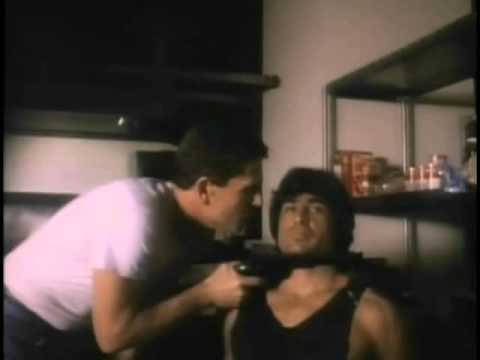
Much better are the moments late in the film that lead up to the massacre hinted at in the film’s opening text. A scene where Harry has a sit down talk with the main criminal (Jeff O’Haco) and they discover they share some of the same sociopathic tendencies is honestly chilling. Harry’s attempt to recreate one of his fantasies by seducing Dr. Johnson goes as badly as expected, but serves to almost justify the inclusion of so many fantasy/nightmare sequences earlier in the film. Gilhuis even manages to ramp up some tension as he crosscuts between Harry loading his guns, Dr. Johnson arguing with police officers that they need to find and arrest Harry before he hurts someone, and Ben helplessly searching for his brother.
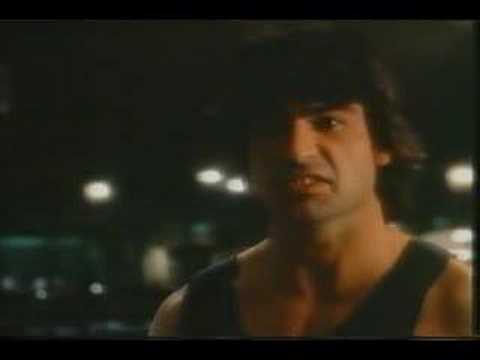
But all of that tension leads to a flat conclusion. Despite everything the filmmakers have shown us regarding Harry’s mental deterioration, nothing ever points to why he would be violent. Simply saying that there are crazy people out there in the world who will snap and randomly kill feels like a cop-out and makes the previous ninety minutes feel like narrative wheel spinning.
The disconnect between the bloody final scene and the relative restraint of what came before it leaves BLOODY WEDNESDAY in an exploitation no-man’s-land. Never tasteless enough to serve as entertaining trash, but too shoddily made to be taken as seriously as the filmmakers seem to intend, the film suffers from a crisis of identity that it never resolves.
–Matt Wedge (@MovieNerdMatt)
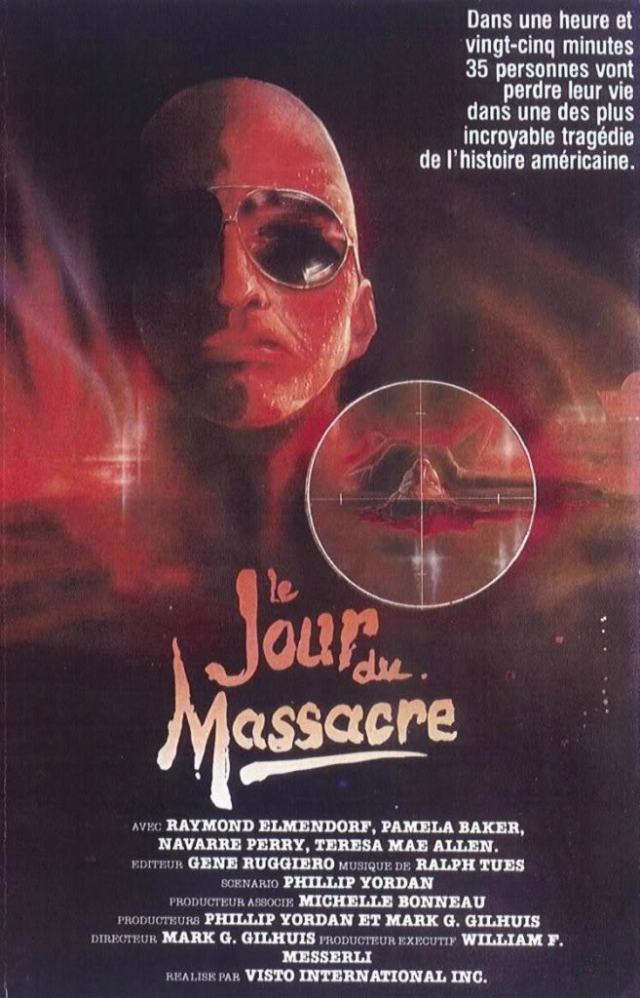
Tags: Bloody Wednesday, Exploitation.TV, Jeff O'Haco, Mark G. Gilhuis, My Exploitation Education, Navarre Perry, Pamela Baker, Philip Yordan, Raymond Elmendorf, Vinegar Syndrome

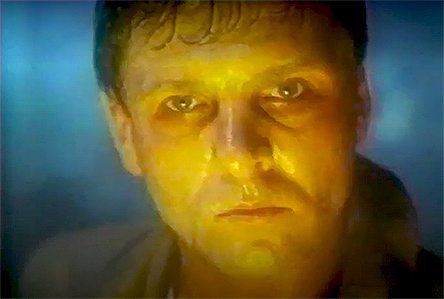
No Comments